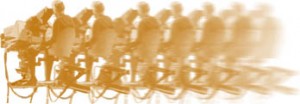This links with:
Hearing Problems
“Pop Group Sound Levels
Alan Machin
Recent reports of deaf musicians show that not all who were subject to high noise levels in entertainment have been so lucky as me (I like to think that I could still hear the line whistle if it were there). As a Sound Supervisor for most of my career I had control of listening levels, but of course as a Gram Op. I was subject to the listening levels (and smoking habits) of my supervisor. The old joke about LE mixers: “they cued the band and the script blew off the desk” was probably apocryphal, but… no names, no pack drill!
The colleagues I felt sorriest for were floor staff, especially cameramen on music shows, winding up the volume in inadequate headphones in order to hear talkback.
Alec Bray
I was tracking the Mole in TVT for Matt Monroe’s “A Song For Europe” – TX live 7th February 1964. As you know, the Mole tracking ramp was right next door to the Band Room.
On this show I finally gave up the unequal struggle to listen over talkback (couldn’t hear the cam 1 cameraman’s talkback (I’m sure he had it ..)) On TX, I was using a script marked up with the moves (rather than a shot card). Matt Monroe sang a word in the lyrics – the Mole tracked forward… I have no idea if there were any last-minute changes – couldn’t hear them. Luckily no one complained …
This was the only show where I just couldn’t hear talkback at all.
By the way, “I Love The Little Things” by Matt came first in “A Song for Europe” and second in the Eurovision Song Contest, which was won by Italy – Gigliola Ciquetti – “Non ho l’età”. (No contest? 17 points to 49).
At the time, there was a rumour that the BBC always aimed to come Second in Eurovision – gave the kudos of nearly winning it without the expense of mounting the show the next year. But that was then …
Alex Thomas
There was a rumour that in 1969 RTE took out insurance at Lloyds against winning The Eurovision Song Contest.
The sum insured would be enough to pay all production costs including a colour OB unit as RTE had not got one. The underwriters at Lloyds decided that, based on Ireland’s past performance, they could ask for a very modest premium.
In 1970, in Amsterdam, Dana took first place with “All Kinds of Everything” and Lloyds paid up.
The contest in Dublin took place in 1971. BBC Tel OBs supplied RTE with the complicated comms gear used in the voting and so, allegedly, Kendal Avenue had a share of Lloyds’s “generosity” but RTE were the real winners.



